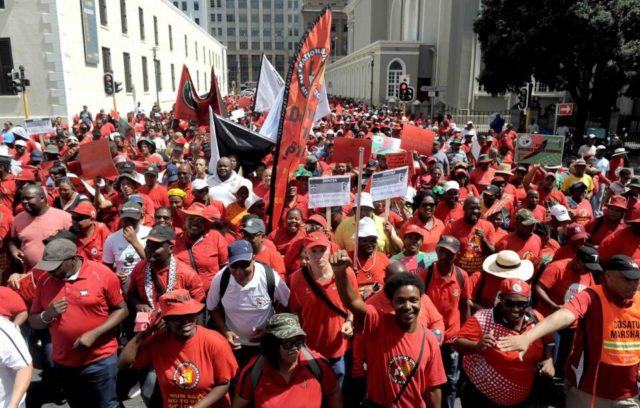Work is set to come to a halt in many workplaces, both within the public and private sector
BUSINESS Unity South Africa (Busa) believes the impact of Wednesday’s national strike by the country’s labour unions and federations will be counterproductive.
Busa chief executive Cas Coovadia told EWN that while they understood the issues which have pushed workers to strike, it would have a severe impact on the economy, diminishing investor confidence in the country even further.
“We are trying to rebuild the economy, not from Covid but from the recession we were in pre-Covid. So, we think it is incorrect to have a protest and a full-day strike,” he said.
Busa did, however, identify with the issues raised by labour around corruption, among other issues which had led to the protest.
Unlike previous strikes, Cosatu, with an estimated membership of 1.8 million workers, the South African Federation of Trade Unions (Saftu) and Federation of Unions of South Africa (Fedusa) have asked their members to stay at home in support of the action due to the impact of the coronavirus pandemic.
“We are convening this action under the Covid-19 lockdown alert Level 1 regulations. This means that we have a responsibility not to undermine the fight against this deadly coronavirus that has killed so many of our compatriots,” the trade federations said.
Work is set to come to a halt in many workplaces, both within the public and private sector.
Cosatu general secretary Bheki Ntshalintshali said: “We need to take a stand and push back against this flagrant theft of taxpayer funds and the disgraceful abandonment of the working class by policymakers and decision makers. The only way to undo this corrupt system is through disruption.”
Ntshalintshali blasted President Cyril Ramaphosa’s administration over the management of the country’s economy, adding that the 2.2 million job losses during the Covid-19 pandemic was an indictment on the performance of his Cabinet.
The government has come under fire from organised labour over its refusal to honour the 2018 multi-term three-year wage increase agreement this year, which unions say is the sign that the ANC-led government was attempting to undermine collective bargaining.
Cosatu and Saftu accused the government of pushing policies of austerity and privatisation at the expense of the working class and the poor, who remained the biggest victims of socio-economic inequalities.
Saftu general secretary Zwelinzima Vavi slammed the continued exclusion of the Saftu from the National Economic Development and Labour Council, despite having grown to become the second biggest federation after Cosatu since its formation in 2017.








